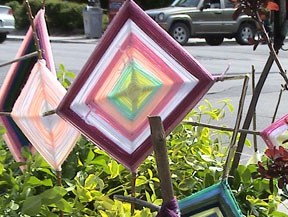© Hilary J. Inwood, 2009
Coming Soon: This dissertation explores curriculum development in eco-art education, an integration of art education and environmental education, as a means of increasing awareness of and engagement with learning about the environment. The creation of eco-art curricula in school settings was investigated by tracking how elementary teachers’ knowledge and understanding of eco-art education resulted in learning experiences for their students.
Guided by the frameworks of collaborative action research and arts-informed research, a team of four elementary teachers and a university-based educator exchanged and generated practical and theoretical knowledge in order to plan, implement, observe and reflect on the development of eco-art curricula over the span of a school year. By drawing on the expertise and experience of the team members, the research aimed to acknowledge the central role teachers play in the design of innovative curricula and pedagogy and maximize the benefits inherent in school-university partnerships.
Data was collected in four schools over the course of nine months, and analyzed, interpreted and shared through a combination of thematic analysis, concept-mapping and arts-informed research strategies. As the first dissertation to examine eco-art learning in a sustained way across multiple school sites, it offers evidence to demonstrate that eco-art curricula can take a multitude of forms and promote environmental learning in a variety of ways. The extensive database of elementary eco-art lessons created as part of the study highlights the roles of collaboration, place-based learning, systems-thinking and stewardship in eco-art learning, as well as the importance of using biodegradable materials and natural processes in making eco-art with children.
Presented as a combination of text and imagery, this dissertation also makes connections between the study and the author’s ongoing work in community arts and guerilla art gardening as a means to elucidate the praxis of eco-art education. In this, eco-art education is shown to offer an innovative means for teachers to weave together learning about art and the environment in school-based settings.
Due to the complexity of its illustrations, this dissertation is currently only available in book form through the library at Concordia University in Montreal, Canada, or through the author. General publication and digital access is in the works.

